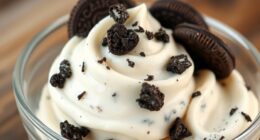Brain freeze, or sphenopalatine ganglioneuralgia, kicks in when you consume something cold too quickly. Your body reacts by constricting blood vessels in the mouth, then rapidly dilating them, which sends pain signals through the trigeminal nerve to your forehead. To avoid this sharp discomfort, try eating cold foods slowly. Pressing your tongue against the roof of your mouth or keeping a warm drink handy can help balance temperatures. Awareness of your sensitivity to cold is key. Interested in how this quick pain links to migraines and other headaches? There's more intriguing information ahead.
Key Takeaways
- Brain freeze occurs when cold stimuli constrict and then dilate blood vessels in the palate, causing pain signals to be sent to the brain.
- The trigeminal nerve transmits pain from the palate to the forehead, resulting in the characteristic headache sensation of brain freeze.
- Consuming cold items slowly allows your mouth to adjust, minimizing the likelihood of triggering a brain freeze episode.
- Pressing your tongue against the roof of your mouth can help warm the area and alleviate discomfort from brain freeze.
- Individuals prone to migraines may experience brain freeze more frequently due to similar underlying mechanisms involving blood flow changes.
Understanding Brain Freeze

When you enjoy a cold treat on a hot day, you might suddenly feel an intense headache—this is brain freeze, or sphenopalatine ganglioneuralgia. This sudden pain occurs when a cold stimulus touches the roof of your mouth, triggering a rapid change in blood flow. The cold causes blood vessels in your palate to constrict and then quickly dilate, sending pain signals to your brain.
The discomfort you experience is often felt in your forehead due to the activation of the trigeminal nerve, which relays pain sensations from your mouth to your brain. Research indicates that this increased blood flow to the anterior cerebral artery notably contributes to the acute pain associated with brain freeze.
While brain freeze is usually harmless, you might find it more frequent if you suffer from migraines, hinting at a shared mechanism in these conditions.
To avoid this cold stimulus headache, try consuming cold foods or drinks slowly. You can also warm your palate with your tongue or have warm liquids nearby to alleviate the effects of extreme cold.
Mechanisms Behind Brain Freeze

Brain freeze happens due to a rapid sequence of physiological responses triggered by extreme cold in your mouth. When you consume something icy, the cold hits the roof of your mouth, causing the blood vessels there to constrict in a process called vasoconstriction. This reaction is your body's attempt to preserve heat.
As the cold sensation lingers, the vessels quickly dilate, leading to an increase in blood flow, which activates the trigeminal nerve. This nerve, responsible for facial sensations, sends intense pain signals to your brain, resulting in the sharp headache you experience.
- Vasoconstriction: The initial response to cold, reducing blood flow to preserve warmth.
- Vasodilation: The subsequent widening of blood vessels, which increases blood flow and triggers pain.
- Duration: The pain typically lasts from 30 seconds to two minutes, showing it's a temporary reaction.
Although brain freeze can be uncomfortable, knowing it's a benign response can help ease your mind.
Preventing Brain Freeze

To dodge the discomfort of brain freeze, it's smart to take your time with cold foods and drinks. By consuming them slowly, you allow your mouth to acclimate to the temperature change, considerably lowering your chances of triggering that dreaded ice cream headache.
If you're particularly sensitive, try pressing your tongue against the roof of your mouth; this can help warm the area and stave off a cold-stimulus headache.
Another effective strategy for preventing brain freeze is to keep a warm drink nearby. Sipping on something warm while indulging in icy treats can help balance the temperature in your mouth, reducing the risk of sudden discomfort.
If you're really keen on avoiding brain freeze altogether, consider skipping extremely cold foods. This is the most foolproof method to eliminate any chances of experiencing this unwelcome sensation.
Remedies for Brain Freeze

If you do end up experiencing brain freeze despite your best efforts, there are several remedies you can try to find relief.
First, consider the warmth of your tongue as a powerful tool. Pressing it against the roof of your mouth can help normalize the temperature and soothe the discomfort.
Additionally, drinking room temperature liquids can work wonders, as they help regulate the temperature in your mouth and throat.
Here are a few more effective remedies:
- Keep a warm drink nearby to provide a quick contrast when you indulge in cold items.
- Consume cold treats slowly to give your mouth time to adjust to the temperature change.
- Be aware of your personal tolerance to cold substances to avoid sudden triggers.
Brain Freeze and Headache Connection

Experiencing brain freeze can be more than just a temporary annoyance; it's a fascinating glimpse into how our bodies respond to temperature changes. When you enjoy cold treats too quickly, your palate activates pain receptors, causing blood vessels in your brain to rapidly constrict and then dilate. This sudden shift can trigger a headache, similar to the pain experienced during migraines.
Interestingly, if you suffer from migraines, you might find yourself more susceptible to brain freeze. The connection lies in the trigeminal nerve, which plays a key role in pain responses for both conditions. Understanding this link could advance treatments for headaches by targeting blood flow regulation.
Here's a summary of the connections between brain freeze and migraines:
| Condition | Trigger | Pain Mechanism |
|---|---|---|
| Brain Freeze | Cold foods/drinks | Sudden blood vessel changes |
| Migraines | Various triggers | Dysfunctional blood flow |
| Both | Temperature shifts | Trigeminal nerve activation |
This table highlights how both conditions share similarities in their mechanisms, emphasizing the potential for new treatment options focused on blood vessel management.
Frequently Asked Questions
What Causes Brain Freeze and How Do You Prevent It?
Brain freeze happens when something cold rapidly cools the roof of your mouth, causing pain. To prevent it, eat cold foods slowly, press your tongue against the roof of your mouth, or sip a warm drink.
What Is the Science Behind the Brain Freeze?
Did you know that about 30% of people experience brain freeze? It's caused by rapid cooling of the palate, triggering pain signals through the trigeminal nerve. Understanding this can help you avoid the discomfort.
How Do You Stop Brain Freeze?
To stop brain freeze, immediately pause your cold treat. Press your tongue against the roof of your mouth to warm it up. You can also sip a warm drink to relieve the discomfort faster.
Why Are Brain Freezes so Painful?
Imagine sipping an icy drink too fast. You feel a sharp, sudden pain in your head. That's brain freeze, caused by rapid blood vessel changes in your palate, activating pain receptors and sending distress signals to your brain.
Conclusion
In the battle against brain freeze, knowledge is your best weapon. By understanding how it strikes, you can dodge its icy grip and savor your favorite cold treats without fear. Remember, a slow, steady approach is your shield, while remedies like warm drinks can help thaw the chill. So next time you're indulging, keep these tips in mind, and enjoy every bite—because life's too short to let a little cold steal your joy!









